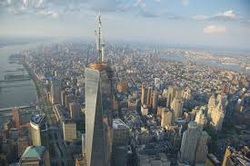 The "Freedom Tower" in lower Manhattan
The "Freedom Tower" in lower Manhattan Edwin Cardinal O’Brien led our Commencement this year. He was my seminary rector in the New York seminary 25 years ago and it sure was good to see him again. He flew all the way from Rome just to bless our graduates and send them on their way with some eminent words of counsel, just as he had given us prudent words in seminary in monthly rector’s conferences in the 1980s. I have not forgotten a bit of counsel he once gave me when I had missed a student social event. He came to my room and said “Joe, all the seminarians and faculty gathered for the banquet this evening and you were the only one not there.” He spoke directly but without disrespecting my freedom. I did not feel condemned or judged but I did feel regretful. “I’m sorry, Msgr. O’Brien,” was all I said. I knew he accepted my regret and trusted by good will for the future. In that brief interchange, my rector defined good leadership, although it’s taken some years to distinguish between attempting to control someone’s behavior and encouraging them to improve it. The key is to respect one’s freedom of responsibility.
Today my family and I viewed Manhattan’s new “Freedom Tower” from a hill in North Jersey. It defines the skyline, as its predecessor Twin Towers had done before November 11, 2001. In one sense I’m proud that our country has been able to rebuild that which was destroyed. It testifies to human ingenuity and spiritedness. But somehow the name rings hollow. Yes, we have the money and manpower to rebuild the tower, even bigger and better than before. But are we more free in 2014 than we were in 1971, when the original towers were completed? Do we imagine that the world is free from the fear of terrorist attacks, or that the inequity between peoples that causes terrorism has been resolved? Do we enjoy freedom and respect from our own government, or from the National Security Agency? Does the government respect freedom of conscience more today than 40 years ago? Are children free to play in the streets? Has the “sexual revolution” freed women? My sense is that we are less free, and that we repeat the word “freedom” in speeches and brand names and buildings to convince ourselves that we are not afraid of the coming barbarism. We are, indeed, prisoners in gated “communities,” trapped in sexual and chemical addictions, and galley slaves to work schedules supporting unsustainable lifestyles.
We are in fact less free to the extent that we progressively renounce the basis for all freedom, which is, in the words of our initial declaration of freedom, “the laws of nature and nature’s God.” The Declaration of Independence is clear that without a common acknowledgement of divine law, there can be no common agreement on human laws. Only the natural law, given us by nature’s God rather than devised by the Supreme Court, can free us from the inevitable abuse of power. Soviet Russia, for example, tried to retool human society based on human law without any reference to divine law, with predictable results.
Last Sunday in the airport, I was talking to a young Jewish graduate in international law from Georgetown University. “I really appreciated the Jesuits,” he enthused, “because they gave us a faith-based perspective on law rather than just the human theories.” God bless the Jesuits at Georgetown, despite all their failings. If they can impart at least the concept of Natural Law into our future lawmakers, they will have done a great service. We may hope that all is not lost, even though mere knowledge of the Natural Law, without grace, is insufficient. But it’s a good start.
The “Freedom Tower” is just a façade if it is not built on the foundation of God’s law. It will collapse, either from foreign terrorists who call our hypocrisy to task, or from American demagogues whose ignorance of the natural law will cause our legal and economic systems to fail. Here on earth there is no freedom without law, and no law without truth, the most fundamental of which is that God exists, and I am not He. “Unless the Lord build the house, in vain do the builders labor.”


 RSS Feed
RSS Feed